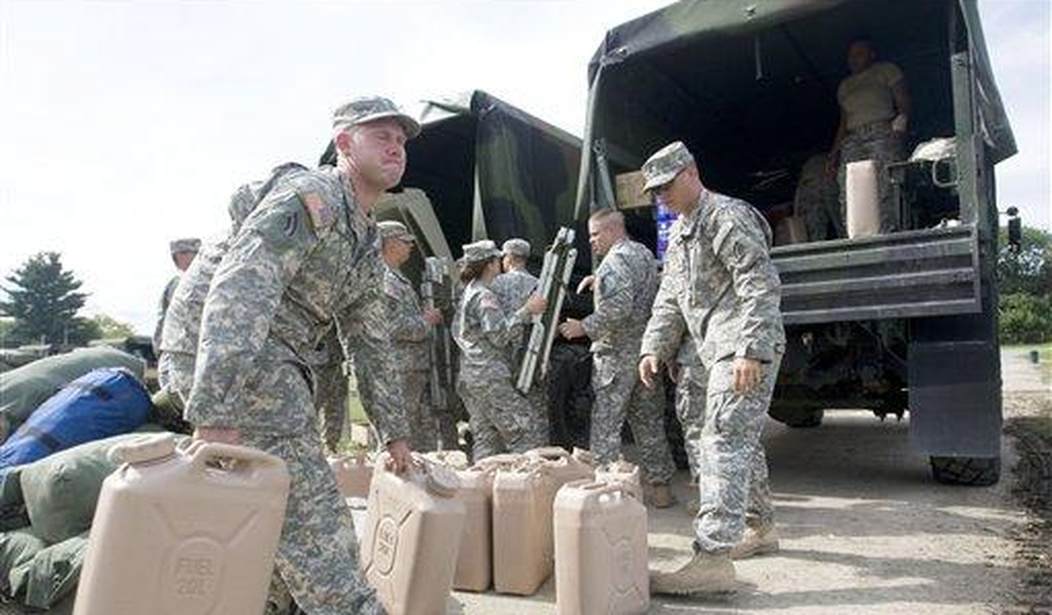One of the more famous of Sherlock Holmes's methods involved "the dog that didn't bark." The tragic death of three Georgia National Guardsmen in Jordan at the “Tower 22” base near the Iraq and Syrian border raises a simple question: Why were members of the Georgia National Guard defending the Jordan border?
I'm not referring simply to President Biden's dereliction of duty in privatizing the U.S. border, immigration, and customs controls to the Mexican drug cartels. Nor to the fact that we've been spending a billion dollars or more each week defending the border of countries in Eastern Europe and the Middle East while ignoring our own. No, the question is, why are we fighting in a foreign war zone with a state National Guard division?
Is the Pentagon holding military forces in reserve for an attack? Are enlistments so low they have no troops to spare? Are we stretched so thin, or is training so far behind schedule that we have no troops to spare? Officially, our Army is engaged in no current combat operations, but we are deploying a division of a state National Guard against Iran.
The U.S. is currently in a two-front proxy war, even as it watches for any move by China on Taiwan. The media, Pentagon, State Department, and White House love to point out that Iranian proxies have done this or that, as in the case of the attack on "Tower 22" or an estimated 170 other proxy attacks. If proxy attacks by other countries are a pejorative term, in fairness, the United States is very active in its own proxy wars.
First is the proxy war in Ukraine, where we have authorized $118 billion to make the world safe for Ukraine to join NATO. Yes, that Biden pipe dream of expanding into the former bread basket of Russia was the original casus belli. Unfortunately, that bad diplomacy, which played into Russian President Putin's desire for Russian expansion, has now been followed by a war strategy that has been long on promises and short on results. So far, Ukraine's territory has been cut off completely from the Black Sea, creating a land bridge to Russia, and it is unlikely to be regained any time soon.
In addition to driving China and Russia into an alliance, it has destabilized Germany, our purported ally. These past weeks, a special trading concession given to Ukraine because of the war has triggered massive farmer protests in Germany, France, Belgium, and Spain that may change the political landscape of those countries for years to come.
In the Israeli civil war, with what the Associated Press estimates to be 85,000 casualties, the United States has made massive transfers of weapons. In December alone, our contribution to Israeli fighting was 14,000 tank shells. Some readers may object to the term civil war, which Webster defines as "a war between opposing groups of citizens of the same country." Of course, part of this fight is who is entitled to full citizenship and which country they are citizens of. Few in Gaza have Israeli passports. So, is it a foreign war or a civil war? In four months of fighting, there are now more casualties than the battles of Gettysburg and Antietam combined. A war, by any other name, is just as bloody. And if you really want to go into the weeds on who is and who isn't a citizen in Israel, have at it here.
RELATED: Iran Strikes Israeli 'Spy Base' In Iraq, Threatening to Widen the War
This brings us back to the question: In a two-front war, what is the future role of American state National Guard divisions? Why are they undertaking roles usually assigned to regular military units in what we are told is peacetime? As we multiply points of conflict with Iran and Russia, and as some U.S. senators and candidates pop off about charging full steam ahead into conflict, what American lives are we willing to risk losing? And how much faith do we have in our political and military leadership to see that their lives are not wasted?
One hopes the United States is not stumbling into a wider war, but if history demonstrates anything, it is that countries that stumble into wider wars often don't realize it until they see the headlights of the onrushing train.










Join the conversation as a VIP Member